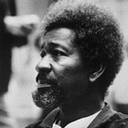Silent Feet & Exits
The fuel subsidy removal and shocks from the Naira devaluation have left a lot of Nigerians in a tough place. One would have expected a dash to the streets to ask questions and demand either the reversal or extensive measures to alleviate the suffering or extract a wholesome reform on the entire government. Apart from the half-hearted NLC protest that was shut down barely 24 hours later, Nigerians have little interest in hitting the streets. The spirit of Aluta is disappearing into the woods.
First, let us acknowledge that Nigerians’ sense of resilience is beyond imaginable levels. Nigerians seem at peace to walk on coals or manage the last edge of a bench. The economy is deteriorating, and the quality of life is slipping, but Nigerians only resist in hushed tones. Who carries the blame? It comes from how previous efforts have panned out: trust has scrapped the barrel’s bottom.
They have been through this same cyclical motion of protests and a raft of inadequate measures — SURE-P, COVID-19 Support Fund, and Social Investment Programs — that have left them clueless about the purpose of “we no go gree.” Most Nigerians have not seen things improve over the years with half-hearted efforts. From where should their interest, like the proverbial ‘renewed hope,’ be rekindled for protests that deliver nothing but perpetuate a hollow passage of cynicism?
You have to dig deeper into the lack of national identity. It also means that if a section of the country felt it was “haram” to hold the previous government to account, why us? Anyone trying to organise a protest or offer criticism is rinsed through the lens of ethnicity and lack of national identity.
Also, Nigerians are finding exits in other quasi-power spaces, and if you think it’s just “Japa”, well, ask Nigerians how many of them can afford that. Nigerians, bathed in religiousness, have, over the years, used churches, mosques, and native religious centres as exit points, dripping in the hope that in the tiny remnant that would leap above the chaos, they would be one. With abundant faith spaces looming at every corner, most Nigerians might have found their social contract, obviously not with the Nigerian state.
Well, we may be far from another EndSARS or OccupyNaija event. I doubt this. Most of these ground-breaking protests are cyclical and affixed with generations. Every generation from ‘Ali Must Go’ to ‘June 12,’ NLC Protests, ‘OccupyNaija’ and ‘EndSARS’ has tried to say “enough is enough” and has been resisted by the Nigerian state with almost next to nothing in terms of results. And the pathway has been to dip into cynicism, safeguard one’s interests or exit the country. So we might have to wait for another ten years before another roaring protest of the EndSARS magnitude, with another generation trying to emphasise itself. As the millennial generation did with Occupy Nigeria, the Gen-Z might have just put their shift in.
Ultimately, this whole quicksand points back to shattered trust — the obliteration of the social contract, the exit into new lands or religious spaces, the slump into cynicism, and the continued weakening of the civic space. We are also losing the civil society in the protest spectrum as all are huddled into breaking the middle and finding gradualist progress points with governments. Movements have been underfunded, and the disappearance of a member-based civil society means consensus is a non-attribute.
Even if civil society is ready, does enough trust permeate the system for Nigerians to follow through? In the famous book Exit, Voice and Loyalty, Albert Hirschman reminds us that the response to a situation in an organisation is either exit or voice. Environments decide if there is an opportunity for citizens to intervene by adding their voice or exiting if they don’t feel they belong. The growing power asymmetry and cynicism to change societies might only lead to one road — increased exit — except other non-state contenders invest resources to deepen trust and bring the society together.
Most Nigerians would instead invest their time to find a meal for the day, maybe until another cycle when they can either show up at the ballot or another cycle of protests to demand their voice be heard. This is where the civil society and non-state actors need to fill in the gap by building intersectional partnerships. Trust is slipping, and there’s no other time to salvage what’s left.
Till then, we press on, famished, exhausted, but hopeful.
A piece woven out of a table conversation with friends in Washington D.C, organized by Mo’ Olateju-Adefeso.
